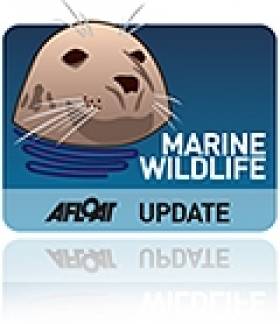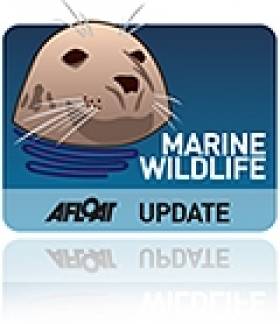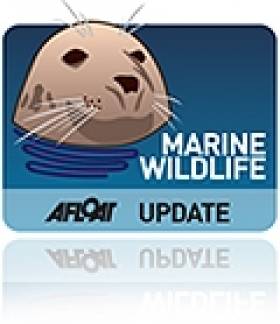Displaying items by tag: The Wildlife Trusts
A new review of marine wildlife in British waters reveals that once-rarely seen humpback whales have rebounded in recent years.
Marine Industry News reports on the 2021 Marine Review from The Wildlife Trusts which notes that humpback whale numbers are recovering since bans on commercial hunting, with more than 75 sightings around Britain since 2019.
Other sightings of note in the last 12 months include two orcas seen off Penzance in Cornwall — the most southerly sighing in half a century — and a 10-strong pod of white-beaked dolphins spitted off Essex for the first time in over two decades.
Elsewhere, puffins have returned to the Isle of Man in the Irish Sea after an absence of 30 years following a vermin control programme.
Wally the Arctic walrus’ adventures around the UK before his trail of destruction along Ireland’s South Coast made for some excitement last summer.
And the world’s largest skate, a juvenile flapper skate, was recorded in Northern Ireland as part of Ulster Wildlife’s Sea Deep programme — whose project officer Ronald Surgenor was awarded a marine conversation award in late 2020.
But concerns remain regarding a series of cetacean and marine mammal strandings around Britain’s coasts, with noise from wind farms and unsustainable fishing practices put under the spotlight.
The Wildlife Trusts website has more on the review HERE.
Conference Calls On UK Govt to 'Save Our Irish Sea'
#MARINE WILDLIFE - Marine experts are calling on the UK public to pile pressure on their government to create Marine Conservation Zones (MCZs) to help protect and restore marine wildlife in the Irish Sea and around the British coast.
The Living Seas North West Conference in Cumbria recently was a call to arms for marine experts and the public to join forces to protect the oceans.
And organisers the North West Wildlife Trusts used the event to press support for nature reserves in the Irish Sea as part of a UK-wide campaign by The Wildlife Trusts for 127 MCZs around the United Kingdom.
Callum Roberts, Professor of Marine Conservation at the University of York, described areas off the Isle of Man which have never been dredged as “carpeted with life”.
He said: “In the 19th century the Irish Sea bed was crusted with oysters. Today it is not just a sea different in the quantity of the wildlife it is different in the quality of the habitats in which that wildlife lives.”
Prof Roberts described how a study showed that dredging to catch 28,000 prawns also caught 12,000 other fish, most of which were thrown away. He also spoke of dives where he has seen the seabed damaged in huge areas by trawling.
“Over-fishing is not the only thing going on in the oceans," he said, "they are also affected by climate change and pollution. Our seas are changing faster than at any other time in human history.”
Prof Roberts said he was not against fishing, but that conservationists and the fishing industry need to find some common ground. “The prosperity of wildlife and the fishing industry depend on it," he said.
Meanwhile, The Wildlife Trusts marine protected areas manager Richard White spoke about the problems caused "by all the things that human activity is doing wrong".
He added: "We are trying to increase the resilience of our marine wildlife. The critical part is that we are doing this by trying to create Marine Conservation Zones.”
Pollution was highlighted by TV star and diver Paul Rose and Caroline Salthouse of the North West Coastal Forum.
“A huge problem is ocean debris," said Rose. "In 43 years of diving I am beginning to see more plastic and less fish. It is an issue that we must use to get people engaged in what is going on in our seas.”
Salthouse called for the public not only to sign the Wildlife Trusts’ new 'Petition Fish', but also to write to the British government as individuals.
More details about the Marine Conservation Zones and Petition Fish can be found at www.wildlifetrusts.org/living-seas
UK Conference to Uncover Secrets of the Irish Sea
#MARINE WILDLIFE - A marine wildlife conference in Cumbria aims to delve deep into the Irish Sea to uncover some of its fascinating secrets.
The Living Seas North West Conference takes place at the Netherwood Hotel in Grange-over-Sands next Friday 19 October and presents an opportunity to discover the diversity of wildlife we have in the Irish Sea – a magnet for hundreds of species from huge basking sharks to tiny molluscs and many varieties of birds.
“The Living Seas North West conference is a chance to learn more about the Irish Sea – what’s in it, what activities go on, what impacts these have had, how it was managed in the past, how it is being managed now and how can we approach its management in the future,” said Cumbria Wildlife Trust marine conservation officer Lindsay Sullivan.
World renowned ocean expert Professor Callum Roberts and explorer, naturalist and TV personality Paul Rose will be among those giving talks on the day, and there will also be discussions hosted by experts from around the UK and Ireland on topics from offshore development and fishing to coastal zone management.
And for anyone aspiring to a career in the marine or coastal environments, the afternoon careers session will introduce them to seasoned experts offering their views on how to land your dream marine job.
The Living Seas North West Conference, hosted by the Irish Sea Wildlife Trusts, runs from 9am-5pm on Friday 19 Octover. Admission is £35 per person (#15 for under-25s and students) and includes a buffet lunch, tea and coffee, and a full delegate pack. For further details visit www.irishsea.org.
Groups Concerned Over UK Govt Plans for Marine Conservation Zones
#MARINE WILDLIFE - Conservationists in the UK have voiced their concern that Westminster will enact fewer than a quarter of the proposed Marine Conservation Zones in British waters.
The Press Association reports that some 127 such zones - including parts of the Irish Sea - have been earmarked by regional conservation groups as areas requiring special environmental protection.
All 127 proposals were reviewed by an independent panel of scientists and government committees before they were to go on public consultation.
But it is now feared that a mere 23 of the total will get the go-ahead, due to a perceived lack of evidence to support the case for the rest.
"To only designate 23 marine conservation zones is equivalent to switching off the life support for our seas," commented Joan Edwards of the Wildlife Trusts.
The Press Association has more on the story HERE.
































































